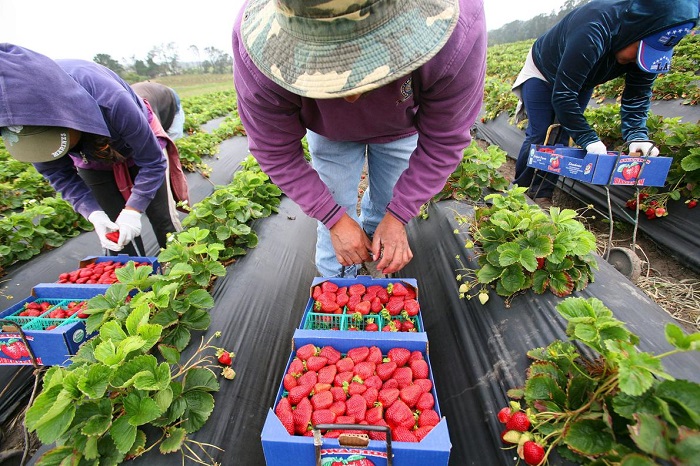Organic Farming Doesn’t Mean Fairer Labor

The first organic unionized farm in America, Swanton is among an increasing number of growers adopting a new label: Food Justice Certified. Just ten miles north of Santa Cruz, a battered black-and-yellow pickup sits rusting in the grass along a gorgeous stretch of coastal California highway. From its bed rises a huge strawberry-shaped silhouette of red-painted wood with green tufts sprouting from its top to mimic leaves. A sign behind the truck says “Jam Tasting” and points past an aging wooden barn to the headquarters of Swanton Berry Farm—the first organic unionized farm in America. The terms “organic” and “unionized” rarely appear together for a reason. Gaining organic certification and unionizing workers is expensive and time-consuming. To farmers already operating with tight profit margins, the prospect of doing both can be daunting. Bruce Goldstein, president of the Washington, D.C., nonprofit Farmworker Justice, estimates that of the roughly 2.5 million farmworkers in America, only around 25,000 are unionized. And only a small percent of those 25,000 work on organic farms. “I have sympathy for farmers who feel they can’t afford to pay their workers better,” says farmer Jim Cochran, who founded Swanton in 1983 and is now a spry, white-haired 69-year-old. “I’m trying to prove that it’s economically feasible to offer good benefits and a living wage and still make money without any subsidies.”
THE DIRECT-TO-CONSUMER SOLUTION
One way that he’s managed to do this is by selling roughly 75 percent of his produce directly to consumers. A quaint one-story shop located behind the barn sells Swanton produce and products. The interior strikes a familiar northern California tone of rustic chic: Antlers, giant pinecones, horseshoes, maps, and an antique clock decorate the wood walls. Glass jars of blackberry, olallieberry, and strawberry jam fill the shelves of a refurbished hutch; orange kabocha squashes are piled in wicker baskets; and slices of homemade pecan, apple, and berry pie line the shelves of a cooler. But mingled with all the country whimsy is a more political theme. On the front counter is a bound 1969 magazine profile of legendary union organizer Cesar Chavez. On the wall behind the honor till—more on this later—hangs the distinctive red-and-black flag of the United Farm Workers, the open-winged eagle at its center a symbol that Chavez hoped would inspire courage in farmworkers. A sign beside the front door reads: “Everything here is homemade by union labor and can be purchased using the honor system.”

